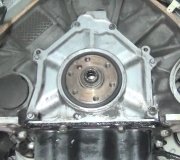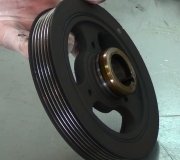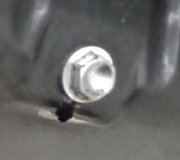Happy to hear the good news. Here's a few more comments on that patch. Where I used silicone gasket sealer on my gas tank there is no real pressure but I was afraid to fill the tank for a year. It was supposed to be temporary so the van could be driven until I found a used tank. Eventually I quit looking and since then I've been on numerous cross-country trips and regularly stuff in every last ounce of gas I can squeeze in when I fill up. When I do think to look at it, that patch is as hard as a rock and shows no signs of leaking.
Engines are a little different in that they can develop a little pressure in the crankcase. That hasn't been a problem on my oil pan because the pinhole I patched was so small. I expected another hole to rust through but that hasn't happened in over five years. When it does, I'm going to order a new pan or find a rust-free one from down south. A new one will double the value of my van, just like when I fill it with gas!
JB Weld is much stronger than the silicone sealer I used, so while I wouldn't patch a customer's car that way, I wouldn't lose much sleep over it either. I always taught my students the "what if" principle. "What if that patch lets go?" Who's reputation is on the line? A new cast oil pan could be porous and seep oil, (that's very rare), but other than that, there isn't much that can go wrong with a new one. Still, if any new part is defective, I'd rather have to explain that than why my cobble-job failed.
As Julie S, my very knowledgeable and entertaining Chrysler trainer used to say, "We not only sell you new parts; we sell them to you pre-broken".
At the very least, I would search for a good used oil pan to have on hand if or when the patch starts to leak. If it does, it's not going to fall off on the road. It will start with small spots on the ground where you park. I'm always checking under my van when I walk up to it, and so far it's always been the guy there ahead of me who left the puddle, ... So far.
SPONSORED LINKS
Thursday, March 1st, 2012 AT 11:20 PM



